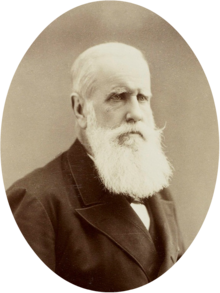Pedro II of Brazil
| Pedro II | |||||
|---|---|---|---|---|---|

Emperor Dom Pedro II around age 61, c.1887
|
|||||
| Emperor of Brazil | |||||
| Reign | 7 April 1831 – 15 November 1889 | ||||
| Coronation | 18 July 1841 | ||||
| Predecessor | Pedro I | ||||
| Successor | Monarchy abolished First Brazilian Republic Deodoro da Fonseca, as President |
||||
| Regents | See list (1831–1840) | ||||
| Prime Ministers | See list | ||||
| Head of the Imperial House of Brazil | |||||
| Tenure | 7 April 1831 – 5 December 1891 | ||||
| Predecessor | Pedro I, Emperor of Brazil | ||||
| Successor | Isabel, Princess Imperial | ||||
| Born |
2 December 1825 Palace of São Cristóvão, Rio de Janeiro, Empire of Brazil |
||||
| Died | 5 December 1891 (aged 66) Paris, France |
||||
| Burial | Cathedral of São Pedro de Alcântara, Petrópolis, Brazil | ||||
| Spouse | Teresa Cristina of the Two Sicilies | ||||
| Issue detail |
|||||
|
|||||
| House | Braganza | ||||
| Father | Pedro I of Brazil | ||||
| Mother | Maria Leopoldina of Austria | ||||
| Religion | Roman Catholicism | ||||
| Signature | |||||
| Full name | |
|---|---|
| Pedro de Alcântara João Carlos Leopoldo Salvador Bibiano Francisco Xavier de Paula Leocádio Miguel Gabriel Rafael Gonzaga |
|
Styles of Pedro II, Emperor of Brazil |
|
|---|---|
 |
|
| Reference style | His Imperial Majesty |
| Spoken style | Your Imperial Majesty |
| Alternative style | Sire |
Dom Pedro II (English: Peter II; 2 December 1825 – 5 December 1891), nicknamed "the Magnanimous", was the second and last ruler of the Empire of Brazil, reigning for over 58 years. Born in Rio de Janeiro, he was the seventh child of Emperor Dom Pedro I of Brazil and Empress Dona Maria Leopoldina and thus a member of the Brazilian branch of the House of Braganza. His father's abrupt abdication and departure to Europe in 1831 left a five-year-old Pedro II as Emperor and led to a grim and lonely childhood and adolescence. Obliged to spend his time studying in preparation for rule, he knew only brief moments of happiness and encountered few friends of his age. His experiences with court intrigues and political disputes during this period greatly affected his later character; he grew into a man with a strong sense of duty and devotion toward his country and his people, yet increasingly resentful of his role as monarch.
Inheriting an Empire on the verge of disintegration, Pedro II turned Portuguese-speaking Brazil into an emerging power in the international arena. The nation grew to be distinguished from its Hispanic neighbors on account of its political stability, zealously guarded freedom of speech, respect for civil rights, vibrant economic growth and especially for its form of government: a functional, representative parliamentary monarchy. Brazil was also victorious in three international conflicts (the Platine War, the Uruguayan War and the Paraguayan War) under his rule, as well as prevailing in several other international disputes and domestic tensions. Pedro II steadfastly pushed through the abolition of slavery despite opposition from powerful political and economic interests. A savant in his own right, the Emperor established a reputation as a vigorous sponsor of learning, culture and the sciences. He won the respect and admiration of scholars such as Charles Darwin, Victor Hugo and Friedrich Nietzsche, and was a friend to Richard Wagner, Louis Pasteur and Henry Wadsworth Longfellow, among others.
...
Wikipedia
